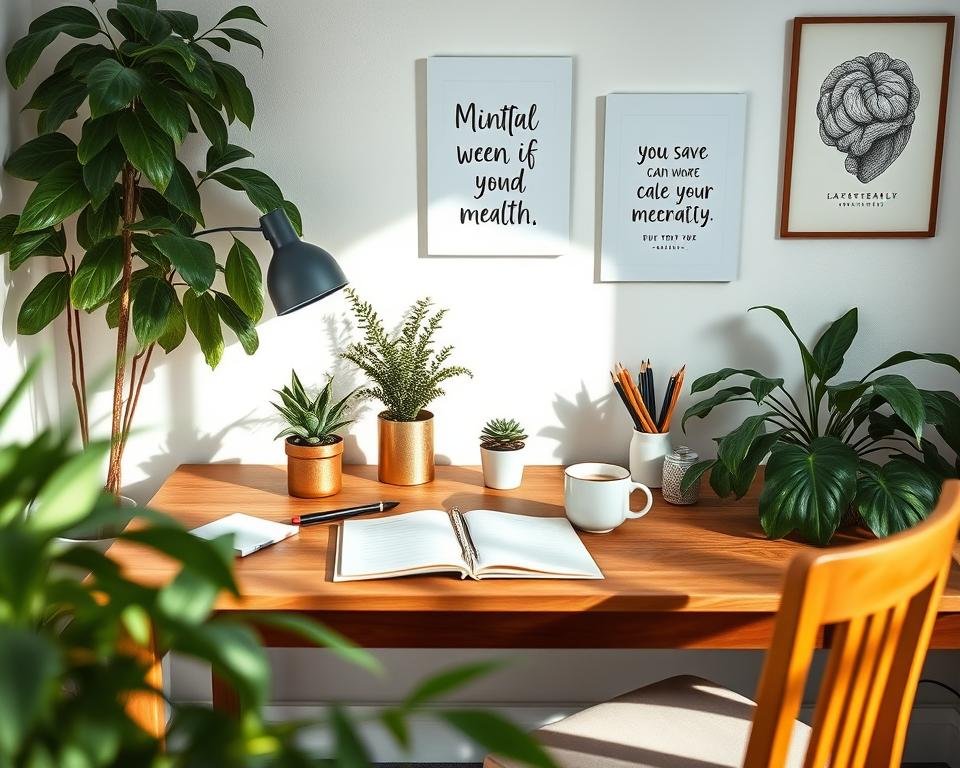Thinking about mental health is key. There are many techniques that can help everyone feel better.
In today’s world, knowing about mental health is vital. Simple techniques can make a big difference in our lives.
Key Takeaways
- Understanding the importance of mental health
- Simple techniques for maintaining good mental health
- Incorporating mental health practices into daily life
- The significance of mental well-being
- Effective ways to improve mental health
Understanding Mental Health Basics
Learning about mental health is the first step to feeling better. As we explore mental health techniques, we need a strong base.
What is Mental Health?
Mental health is about our emotions, thoughts, and how we act. It helps us deal with stress, connect with others, and make choices. Mental wellness is more than just not being sick. It’s feeling good, handling stress, and helping others.
Importance of Mental Health
Good mental health is key for a happy life. It helps us handle stress, get along with people, and make smart choices. It’s important for a balanced life and reaching our goals.
- Mental health affects physical health.
- It influences relationships and social interactions.
- Good mental health improves productivity and performance.
Common Mental Health Issues
Common issues include anxiety, depression, bipolar disorder, and PTSD. Knowing about these helps us support each other and find the right help.
- Anxiety disorders involve excessive fear and anxiety.
- Depression is characterized by persistent sadness and loss of interest.
- Bipolar disorder involves extreme mood swings.
Techniques for Stress Management
Getting mental clarity starts with learning to manage stress. It’s key for keeping your mind healthy and feeling good. Simple yet strong methods can cut down stress and boost your mental focus.
Breathing Exercises
Breathing exercises are a simple yet effective way to manage stress. They help calm your mind and lower anxiety. Diaphragmatic breathing, or belly breathing, is a popular method.
- Start by sitting comfortably with your back straight.
- Place one hand on your belly and the other on your chest.
- Take a deep breath in through your nose, allowing your belly to rise while your chest remains steady.
- Exhale slowly through your mouth, feeling your belly fall.
Doing breathing exercises regularly can improve your mental clarity and lower stress.

Mindfulness Meditation
Mindfulness meditation is a strong tool for stress management. It’s about focusing on the now without judgment. It can lessen anxiety and help control emotions.
| Benefits | Description |
|---|---|
| Reduces Stress | Mindfulness meditation helps in managing stress by promoting relaxation. |
| Improves Focus | Regular practice improves attention and concentration. |
| Enhances Emotional Regulation | Mindfulness helps in understanding and managing emotions better. |
Time Management Tips
Good time management is key to reducing stress. It helps balance work and life. Here are some tips:
- Prioritize tasks based on importance and urgency.
- Break down large tasks into smaller, manageable chunks.
- Use a calendar or planner to stay organized.
- Avoid multitasking, as it can increase stress.
Using these time management tips can lead to better mental clarity and less stress. This makes for a more balanced and productive life.
The Role of Nutrition in Mental Health
Eating well is not just for our bodies. It also boosts our mental health. Foods that are good for our brains can make us feel better, reduce stress, and help with mental health issues.
Mood-Boosting Foods
Some foods are great for our minds. These include:
- Fatty Fish: Rich in omega-3 fatty acids, which support brain health.
- Nuts and Seeds: High in healthy fats and antioxidants.
- Fruits and Vegetables: Packed with vitamins, minerals, and fiber.
- Whole Grains: Good source of complex carbohydrates and fiber.

The Impact of Dehydration
Not drinking enough water can harm our mental health. It can cause anxiety, depression, and tiredness. Drinking enough water is key for our brain function and mood.
Supplements to Consider
While eating right is key, some supplements can help too. These include:
| Supplement | Benefits |
|---|---|
| Omega-3 Fatty Acids | Supports brain health and reduces inflammation. |
| Vitamin D | Important for mood regulation and overall health. |
| Probiotics | Supports gut health, which is linked to mental well-being. |
Learning about nutrition and mental health helps us make better choices. It supports our mental strength and overall health.
Physical Activity and Its Benefits
Making physical activity a part of your day can really help your mental strength. Exercise does more than just keep you fit. It also makes you feel better mentally.
Stress Relief through Exercise
Exercise is a natural way to reduce stress. It releases endorphins, which are like happiness hormones. These help lower anxiety and depression, making you feel calm and happy. Regular exercise can lower stress and boost your mental health.
- Reduces anxiety and depression symptoms
- Improves mood and overall sense of well-being
- Enhances sleep quality
Variety of Exercises to Try
There are many exercises you can do every day. You can try running, cycling, or yoga. Finding something fun to do is important to keep exercising.

Creating a Consistent Routine
It can be hard to start a regular exercise routine. But it’s worth it for your mental health. Start small and slowly add more to your routine. Sticking with it is important for mental strength.
- Set realistic goals and track progress
- Find a workout buddy or join a fitness group
- Mix up your routine to avoid boredom
Adding physical activity to your daily life can greatly improve your mental strength. It’s about making exercise a fun and lasting part of your life.
Building Healthy Relationships
The connections we make with others can greatly influence our mental health and stability. Healthy relationships are built on mutual respect, trust, and effective communication.
Social Support’s Role
Having a strong support system is vital for our mental well-being. It gives us a sense of belonging and helps us through tough times. Studies show that people with strong social connections have better mental health.
Here are some key benefits of having strong social support:
- Emotional support during challenging times
- Improved mental health outcomes
- A sense of belonging and connection
Effective Communication
Effective communication is the backbone of any healthy relationship. It means actively listening, expressing ourselves clearly, and being open to feedback.
To improve your communication skills, consider these tips:
| Skill | Description | Benefit |
|---|---|---|
| Active Listening | Fully concentrating on what the other person is saying | Better understanding and empathy |
| Clear Expression | Articulating your thoughts and feelings clearly | Reduced misunderstandings |
| Receptivity to Feedback | Being open to and acting on feedback | Improved relationship dynamics |
Boundary Setting
Setting boundaries is essential in maintaining healthy relationships. It means setting clear limits on what you are and are not comfortable with.
Here are some steps to set healthy boundaries:
- Identify your limits
- Communicate your boundaries clearly
- Maintain your boundaries consistently

By focusing on building healthy relationships through social support, effective communication, and boundary setting, we can significantly enhance our mental stability.
Cognitive Behavioral Techniques
Cognitive Behavioral Techniques help us understand and change bad thoughts. They make it easier to handle stress and anxiety. This leads to better mental health.
Understanding Cognitive Behavioral Therapy (CBT)
Cognitive Behavioral Therapy (CBT) is a way to talk about thoughts and actions. It helps people deal with depression and anxiety. It’s very effective.
CBT is based on several core principles:
- Identifying distorted or unhelpful thinking patterns
- Challenging and reframing negative thoughts
- Learning new coping skills and behaviors
Reframing Negative Thoughts
Changing bad thoughts is key in CBT. It means finding better ways to think. For instance, “I will never be able to do this” becomes “I will learn and grow from this experience.”
Here is an example of how to reframe negative thoughts:
| Negative Thought | Reframed Thought |
|---|---|
| I am a failure. | I made a mistake, but I can learn from it. |
| I will never be happy. | I am experiencing difficulties now, but I have been happy before and can be again. |

Journaling for Self-Reflection
Journaling helps us think about ourselves. It works well with CBT. Writing down thoughts and feelings helps us understand ourselves better.
Benefits of journaling include:
- Increased self-awareness
- Improved emotional regulation
- Enhanced problem-solving skills
Incorporating Mindfulness Practices
Mindfulness is key for mental wellness. It means being in the moment and noticing our thoughts and feelings without judging. Adding mindfulness to our daily life boosts our mental health.

Daily Mindfulness Exercises
Starting the day with mindfulness sets a good tone. Simple acts like deep breathing, body scan meditation, or mindful walking help a lot. For example, morning deep breathing calms the mind and gets the body ready for the day.
Body scan meditation is also great. You lie down or sit and focus on your body, starting from your toes to your head. It helps release tension and relaxes you.
Benefits of Daily Mindfulness:
- Reduces stress and anxiety
- Improves focus and concentration
- Enhances emotional regulation
Benefits of Gratitude Journaling
Gratitude journaling is a strong mindfulness practice. It’s about writing down things you’re thankful for each day. It shifts your focus to the positive, improving your mental health.
| Benefits | Description |
|---|---|
| Increased Positivity | Focusing on what you’re grateful for increases positive thoughts. |
| Better Sleep | Reflecting on gratitude before bed can improve sleep quality. |
| Enhanced Resilience | Practicing gratitude helps in coping with stress and adversity. |
The Power of Visualization
Visualization is a powerful mindfulness practice. It’s about imagining a positive outcome or scenario. It boosts motivation and confidence, which are key for mental wellness.
To practice visualization, find a quiet spot, close your eyes, and imagine achieving your goals. Use all your senses to make it vivid.
Tips for Effective Visualization:
- Be specific about what you want to achieve.
- Use positive and present-tense language.
- Practice regularly for best results.
By adding these mindfulness practices to our daily lives, we can greatly improve our mental wellness. Whether it’s through mindfulness exercises, gratitude journaling, or visualization, the benefits are huge and lasting.
Seeking Professional Help
Getting help for your mental health is a sign of strength, not weakness. Sometimes, we need more than self-care to deal with our mental challenges.
When to Reach Out to a Therapist
If you feel sad, anxious, or overwhelmed often, it’s time to think about therapy. Signs include trouble with relationships, dealing with trauma, or big life changes. Seeing these signs early can help your mental health and clarity.
Talking to a therapist can be a safe way to share your feelings. You can learn new ways to handle your mental health.
How to Choose a Mental Health Professional
Choosing the right therapist is important. Look at their specialty, approach, and if you feel comfortable with them. It’s key to find someone you can talk to about your mental health.
- Check their credentials and experience with your issues.
- Think about the therapy they offer and if it fits your needs.
- Ask questions during an initial meeting to see if you’re a good match.
What to Expect in Therapy
In therapy, you’ll find a safe and private place to talk about your feelings. The therapist will help you find ways to improve your mental health.
Therapy is a team effort that gives you tools to manage your mental health better.

Getting professional help is a big step towards better mental health. By knowing when and how to ask for help, you can take charge of your mental health journey.
Creating a Personalized Mental Health Plan
Creating a mental health plan that fits you is key. It helps you stay strong and resilient. By being proactive, you can handle life’s ups and downs better.
Establishing Achievable Objectives
Setting goals that are within reach is important. It helps you make progress in your mental health. By setting clear goals, you can track your success and learn from your journey.
Expanding Knowledge on Mental Health
Learning more about mental health is essential. It keeps you informed and ready for new challenges. This knowledge helps you make smart choices and stay resilient.
Assessing Progress
Checking how you’re doing is vital. It helps you fine-tune your mental health plan. By watching your successes and challenges, you can adjust your plan to keep moving forward.
By following these steps, you can manage your mental health. You’ll build the resilience needed to succeed in today’s world.
FAQ
What are some simple techniques to improve mental well-being?
Simple techniques like breathing exercises and mindfulness meditation can help. Journaling also reduces stress and boosts mental clarity.
How does nutrition impact mental health?
Good nutrition is key for mental health. Eating mood-boosting foods and staying hydrated helps. Some supplements can also support mental wellness.
Can physical activity really benefit mental health?
Yes, exercise is great for mental health. It reduces stress and boosts mental resilience. A regular exercise routine can greatly improve your mental well-being.
How can I build healthy relationships to support my mental health?
Building healthy relationships is important. Cultivate social support and learn to communicate well. Setting boundaries also helps. These steps can improve your mental stability.
What are some cognitive behavioral techniques that can help with mental health?
Techniques like Cognitive Behavioral Therapy (CBT) are helpful. Reframing negative thoughts and journaling can also improve mental health. These tools can lead to better mental well-being.
How can mindfulness practices be incorporated into daily life?
Mindfulness practices like daily exercises and gratitude journaling are beneficial. Visualization also helps. Adding these to your daily routine can improve your mental health.
When should I consider seeking professional help for my mental health?
If you’re struggling, it’s important to know when to seek help. Choosing the right therapist and understanding therapy are key. These steps can help you achieve mental well-being.
How can I create a personalized mental health plan?
Creating a mental health plan involves setting goals and learning about mental health. Regularly check your progress. Following these steps can help you build mental strength.



